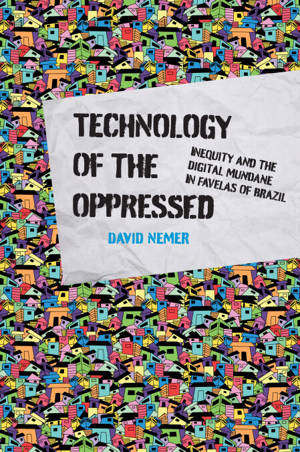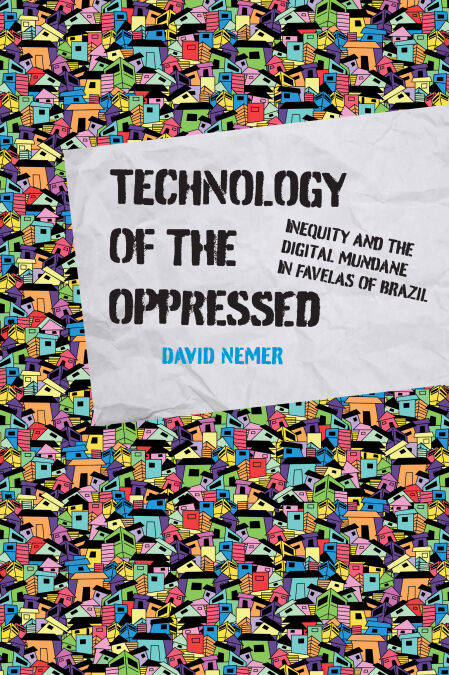
Bedankt voor het vertrouwen het afgelopen jaar! Om jou te bedanken bieden we GRATIS verzending (in België) aan op alles gedurende de hele maand januari.
- Afhalen na 1 uur in een winkel met voorraad
- In januari gratis thuislevering in België
- Ruim aanbod met 7 miljoen producten
Bedankt voor het vertrouwen het afgelopen jaar! Om jou te bedanken bieden we GRATIS verzending (in België) aan op alles gedurende de hele maand januari.
- Afhalen na 1 uur in een winkel met voorraad
- In januari gratis thuislevering in België
- Ruim aanbod met 7 miljoen producten
Zoeken
Technology of the Oppressed E-BOOK
Inequity and the Digital Mundane in Favelas of Brazil
David Nemer
€ 34,49
+ 34 punten
Omschrijving
How Brazilian favela residents engage with and appropriate technologies, both to fight the oppression in their lives and to represent themselves in the world.
Brazilian favelas are impoverished settlements usually located on hillsides or the outskirts of a city. In Technology of the Oppressed, David Nemer draws on extensive ethnographic fieldwork to provide a rich account of how favela residents engage with technology in community technology centers and in their everyday lives. Their stories reveal the structural violence of the information age. But they also show how those oppressed by technology don’t just reject it, but consciously resist and appropriate it, and how their experiences with digital technologies enable them to navigate both digital and nondigital sources of oppression—and even, at times, to flourish.
Nemer uses a decolonial and intersectional framework called Mundane Technology as an analytical tool to understand how digital technologies can simultaneously be sites of oppression and tools in the fight for freedom. Building on the work of the Brazilian educator and philosopher Paulo Freire, he shows how the favela residents appropriate everyday technologies—technological artifacts (cell phones, Facebook), operations (repair), and spaces (Telecenters and Lan Houses)—and use them to alleviate the oppression in their everyday lives. He also addresses the relationship of misinformation to radicalization and the rise of the new far right. Contrary to the simplistic techno-optimistic belief that technology will save the poor, even with access to technology these marginalized people face numerous sources of oppression, including technological biases, racism, classism, sexism, and censorship. Yet the spirit, love, community, resilience, and resistance of favela residents make possible their pursuit of freedom.
Brazilian favelas are impoverished settlements usually located on hillsides or the outskirts of a city. In Technology of the Oppressed, David Nemer draws on extensive ethnographic fieldwork to provide a rich account of how favela residents engage with technology in community technology centers and in their everyday lives. Their stories reveal the structural violence of the information age. But they also show how those oppressed by technology don’t just reject it, but consciously resist and appropriate it, and how their experiences with digital technologies enable them to navigate both digital and nondigital sources of oppression—and even, at times, to flourish.
Nemer uses a decolonial and intersectional framework called Mundane Technology as an analytical tool to understand how digital technologies can simultaneously be sites of oppression and tools in the fight for freedom. Building on the work of the Brazilian educator and philosopher Paulo Freire, he shows how the favela residents appropriate everyday technologies—technological artifacts (cell phones, Facebook), operations (repair), and spaces (Telecenters and Lan Houses)—and use them to alleviate the oppression in their everyday lives. He also addresses the relationship of misinformation to radicalization and the rise of the new far right. Contrary to the simplistic techno-optimistic belief that technology will save the poor, even with access to technology these marginalized people face numerous sources of oppression, including technological biases, racism, classism, sexism, and censorship. Yet the spirit, love, community, resilience, and resistance of favela residents make possible their pursuit of freedom.
Specificaties
Betrokkenen
- Auteur(s):
- Uitgeverij:
Inhoud
- Aantal bladzijden:
- 230
- Taal:
- Engels
- Reeks:
Eigenschappen
- Productcode (EAN):
- 9780262368629
- Verschijningsdatum:
- 14/02/2022
- Uitvoering:
- E-book
- Beveiligd met:
- Adobe DRM
- Formaat:
- ePub

Alleen bij Standaard Boekhandel
+ 34 punten op je klantenkaart van Standaard Boekhandel
Beoordelingen
We publiceren alleen reviews die voldoen aan de voorwaarden voor reviews. Bekijk onze voorwaarden voor reviews.









